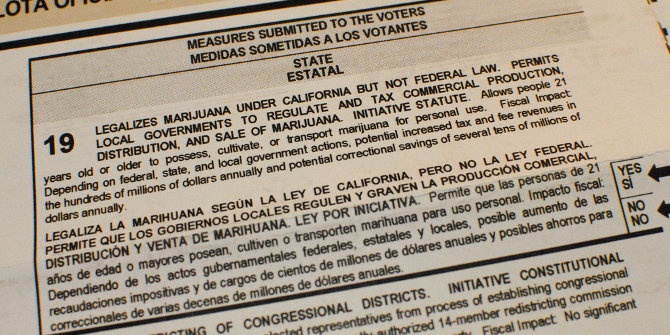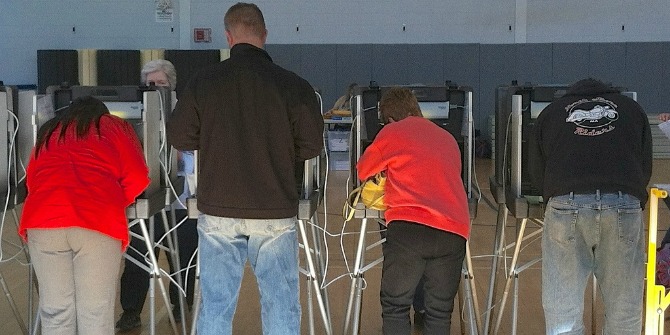 This holiday season, millions of Americans will gather with their families, some for the first time in nearly two years. But these gatherings may not all be happy ones, writes Dan Cassino. Discussing the findings of a national survey, he finds that those who want to talk about social and political issues are more likely to hold false beliefs about them, to the likely dismay of family members whose beliefs are based on facts. This is made worse, he argues, by men who are attempting to assert their own sense of masculinity by “mansplaining” their false beliefs to others.
This holiday season, millions of Americans will gather with their families, some for the first time in nearly two years. But these gatherings may not all be happy ones, writes Dan Cassino. Discussing the findings of a national survey, he finds that those who want to talk about social and political issues are more likely to hold false beliefs about them, to the likely dismay of family members whose beliefs are based on facts. This is made worse, he argues, by men who are attempting to assert their own sense of masculinity by “mansplaining” their false beliefs to others.
After a year in which many did not see their families for the holidays, most Americans say that they’re back to family gatherings this year – but not everyone is happy about it, and politics is one of the major reasons why. Not only are people who hold demonstrably false views about political and social issues most likely to like talking and arguing about politics, they’re also more likely to think that they know more about them than other people. As a result, the people who don’t hold false views about things like the 2020 US Presidential election, or COVID-19 vaccines, are more likely to say that they are dreading the holidays. Underlying all of this is gender: this kind of “mansplaining” is one way that men can assert their masculinity.
To look at these issues, the Fairleigh Dickinson University Poll carried out a national live caller survey of registered voters. While most Americans say that they look forward to seeing their relatives over the holidays, fourteen percent say that they’re conflicted, and four percent say that they “dread” the experience. But those figures hide real differences based on political views. For instance, as Figure 1 shows that just 12 percent of Americans who “strongly agree” with the idea that COVID-19 vaccines are “more dangerous than we’re being told” say that they’re conflicted or dread seeing their relatives. In contrast, 22 percent of Americans who think that the government is telling the truth about vaccines are conflicted or dread seeing their relatives. Similarly, people who know that the 2020 US Presidential election was not stolen are nine points more likely to be ambivalent about, or dread, seeing their relatives.
Figure 1 – How do you feel about seeing relatives?
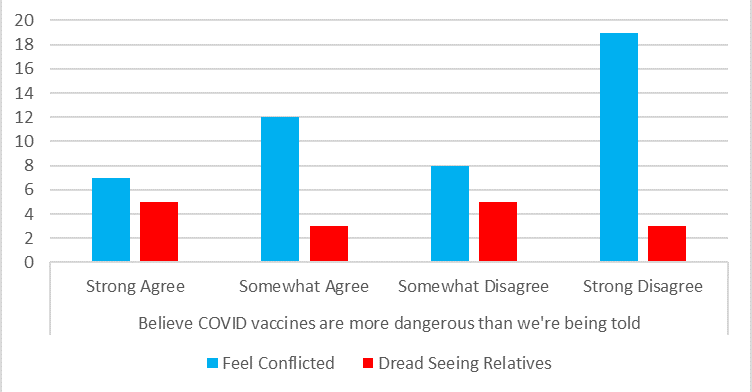
Those with false beliefs want to tell you about them
Making matters worse, people who hold false beliefs are more likely to want to talk about social and political issues. This isn’t about partisanship – Republicans and Democrats are very much alike in how much they say they enjoy talking about political issues with their families – but about false beliefs. People who think that 9/11 was an inside job, or that the moon landing was faked really believe that they have better information than everyone else, and that it’s incumbent on them to share it. For instance, 60 percent of Americans who “strongly agree” that COVID vaccines are more dangerous than we’re being told also “strongly” agree with the statement that they like talking about social and political issues. That figure is 16 points lower among Americans who do not believe that the government is lying about the dangers of vaccines. There is a similar gap when we ask Americans whether they know more about political and social issues than others: people who hold false beliefs say that they know more than most other people do. The problem isn’t that they don’t know a lot, but rather that a lot of what they know simply isn’t true.
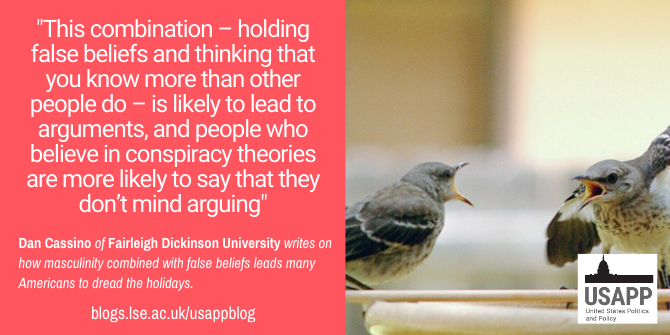
Image credit: Chiltepinster, CC BY-SA 3.0 via Wikimedia Commons
This combination – holding false beliefs and thinking that you know more than other people do – is likely to lead to arguments, and people who believe in conspiracy theories are more likely to say that they don’t mind arguing. In the survey, Americans were asked to agree or disagree with the statement “If someone says something I disagree with, I let them know about it.” Overall, 29 percent “strongly” agree with this, and another 40 percent “somewhat” agree. While Democrats and Republicans aren’t much different on this measure, people who hold unsubstantiated beliefs about major issues are very different from everyone else. For instance, Americans who think there was significant voter fraud in the 2020 election are 13 percentage points more likely to let others know when they disagree than those who reject the idea of significant fraud in 2020 (39 versus 26 percent).
How mansplaining may be ruining the holidays for many
In sum, people who hold false beliefs are vocal about them, and those who don’t hold such beliefs are not looking forward to Holiday get togethers. What’s strange is that the people who hold these beliefs, and are vocal about them, are the ones who are most looking forward to the Holidays, apparently not realizing that they’re making everyone else feel differently. What would drive people to have conversations, even arguments, with people that don’t hold these false beliefs? A lot of it has to do with masculinity. In our society, masculinity isn’t a given, but something that must be proven, again and again, so men who are trying to assert a strong masculine identity must take every opportunity to do so. In the survey, respondents were asked to assess their own gender identity, on a scale running from “completely masculine” to “completely feminine.”
As Figure 2 shows, men who assert a “completely” masculine identity are much more likely than any other group to agree with the statement “it’s important to voice my opinion, even if others disagree with it.” (48 percent “strongly agree,” versus 38 percent for other men; 39 percent of women say the same, with no difference between gender groups). They’re also more likely than other groups to agree with the statement “if someone says something I disagree with, I let them know about it.” On average, these look like differences between men and women – but they’re not. The difference is between this group of men looking to assert a “completely masculine” gender identity, and everyone else. Men who say that they have any other gender identity aren’t any different from women on these measures, nor are “completely feminine” women much different than other women.
Figure 2 – If someone says something I disagree with, I let them know
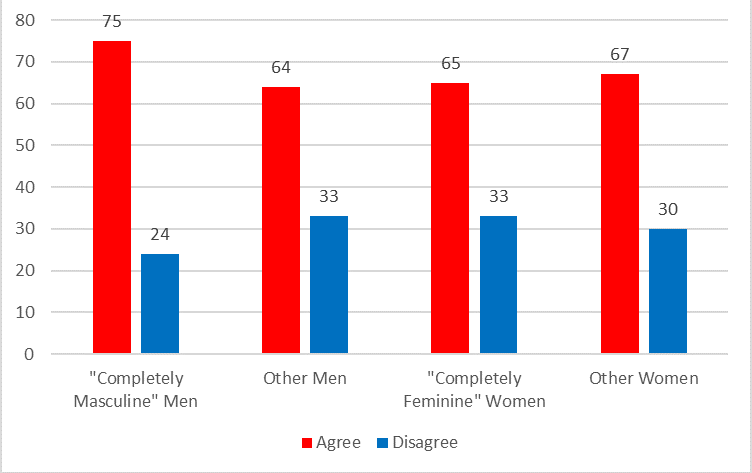
This phenomenon – men asserting their dominance by arguing about important issues, even, and perhaps even especially when they’re wrong about them – has been given a name in recent years: “mansplaining.” This combination of false beliefs and being willing to argue about them among men looking to assert their masculinity is not only making online spaces uncomfortable for many people: it’s also ruining the Holidays.
Please read our comments policy before commenting
Note: This article gives the views of the authors, and not the position of USAPP– American Politics and Policy, nor of the London School of Economics.
Shortened URL for this post: https://bit.ly/3DRjQoX
About the author
 Dan Cassino – Fairleigh Dickinson University
Dan Cassino – Fairleigh Dickinson University
Dan Cassino is a Professor of Government and Politics at Fairleigh Dickinson University. His new book, with Yasemin Besen-Cassino, is “Gender Threat: American Masculinity in the Face of Change” will be released in November 2021.



